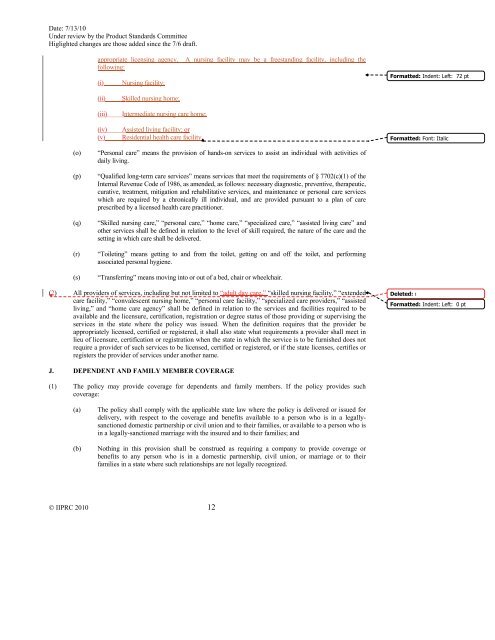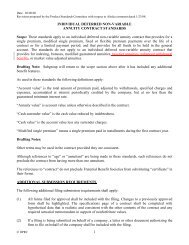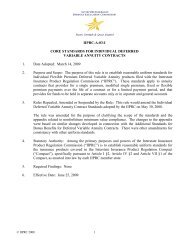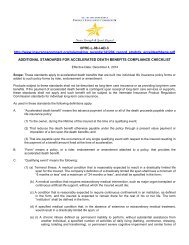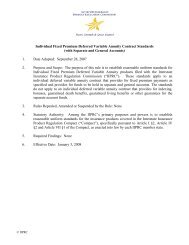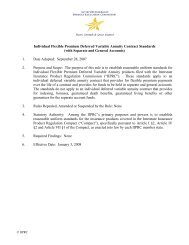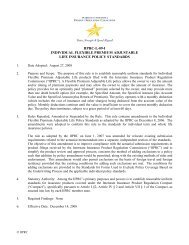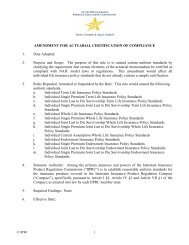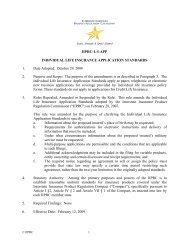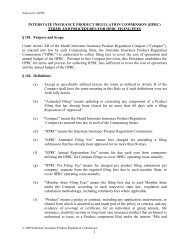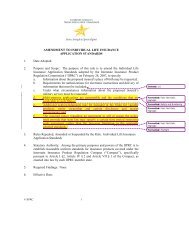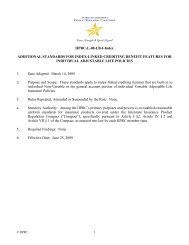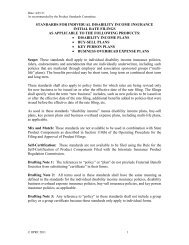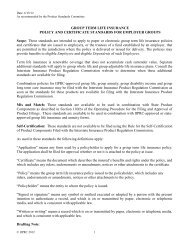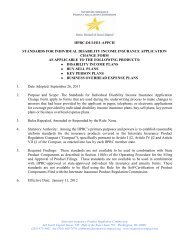core standards for individual long term care insurance policies
core standards for individual long term care insurance policies
core standards for individual long term care insurance policies
Create successful ePaper yourself
Turn your PDF publications into a flip-book with our unique Google optimized e-Paper software.
Date: 7/13/10<br />
Under review by the Product Standards Committee<br />
Higlighted changes are those added since the 7/6 draft.<br />
appropriate licensing agency. A nursing facility may be a freestanding facility, including the<br />
following:<br />
(i)<br />
Nursing facility;<br />
Formatted: Indent: Left: 72 pt<br />
(ii)<br />
(iii)<br />
(iv)<br />
(v)<br />
Skilled nursing home;<br />
In<strong>term</strong>ediate nursing <strong>care</strong> home;<br />
Assisted living facility; or<br />
Residential health <strong>care</strong> facility.<br />
Formatted: Font: Italic<br />
(o)<br />
(p)<br />
(q)<br />
(r)<br />
(s)<br />
“Personal <strong>care</strong>” means the provision of hands-on services to assist an <strong>individual</strong> with activities of<br />
daily living.<br />
“Qualified <strong>long</strong>-<strong>term</strong> <strong>care</strong> services” means services that meet the requirements of § 7702(c)(1) of the<br />
Internal Revenue Code of 1986, as amended, as follows: necessary diagnostic, preventive, therapeutic,<br />
curative, treatment, mitigation and rehabilitative services, and maintenance or personal <strong>care</strong> services<br />
which are required by a chronically ill <strong>individual</strong>, and are provided pursuant to a plan of <strong>care</strong><br />
prescribed by a licensed health <strong>care</strong> practitioner.<br />
“Skilled nursing <strong>care</strong>,” “personal <strong>care</strong>,” “home <strong>care</strong>,” “specialized <strong>care</strong>,” “assisted living <strong>care</strong>” and<br />
other services shall be defined in relation to the level of skill required, the nature of the <strong>care</strong> and the<br />
setting in which <strong>care</strong> shall be delivered.<br />
“Toileting” means getting to and from the toilet, getting on and off the toilet, and per<strong>for</strong>ming<br />
associated personal hygiene.<br />
“Transferring” means moving into or out of a bed, chair or wheelchair.<br />
(2) All providers of services, including but not limited to “adult day <strong>care</strong>,” “skilled nursing facility,” “extended<br />
<strong>care</strong> facility,” “convalescent nursing home,” “personal <strong>care</strong> facility,” “specialized <strong>care</strong> providers,” “assisted<br />
living,” and “home <strong>care</strong> agency” shall be defined in relation to the services and facilities required to be<br />
available and the licensure, certification, registration or degree status of those providing or supervising the<br />
services in the state where the policy was issued. When the definition requires that the provider be<br />
appropriately licensed, certified or registered, it shall also state what requirements a provider shall meet in<br />
lieu of licensure, certification or registration when the state in which the service is to be furnished does not<br />
require a provider of such services to be licensed, certified or registered, or if the state licenses, certifies or<br />
registers the provider of services under another name.<br />
Deleted: t<br />
Formatted: Indent: Left: 0 pt<br />
J. DEPENDENT AND FAMILY MEMBER COVERAGE<br />
(1) The policy may provide coverage <strong>for</strong> dependents and family members. If the policy provides such<br />
coverage:<br />
(a)<br />
(b)<br />
The policy shall comply with the applicable state law where the policy is delivered or issued <strong>for</strong><br />
delivery, with respect to the coverage and benefits available to a person who is in a legallysanctioned<br />
domestic partnership or civil union and to their families, or available to a person who is<br />
in a legally-sanctioned marriage with the insured and to their families; and<br />
Nothing in this provision shall be construed as requiring a company to provide coverage or<br />
benefits to any person who is in a domestic partnership, civil union, or marriage or to their<br />
families in a state where such relationships are not legally recognized.<br />
© IIPRC 2010 12


